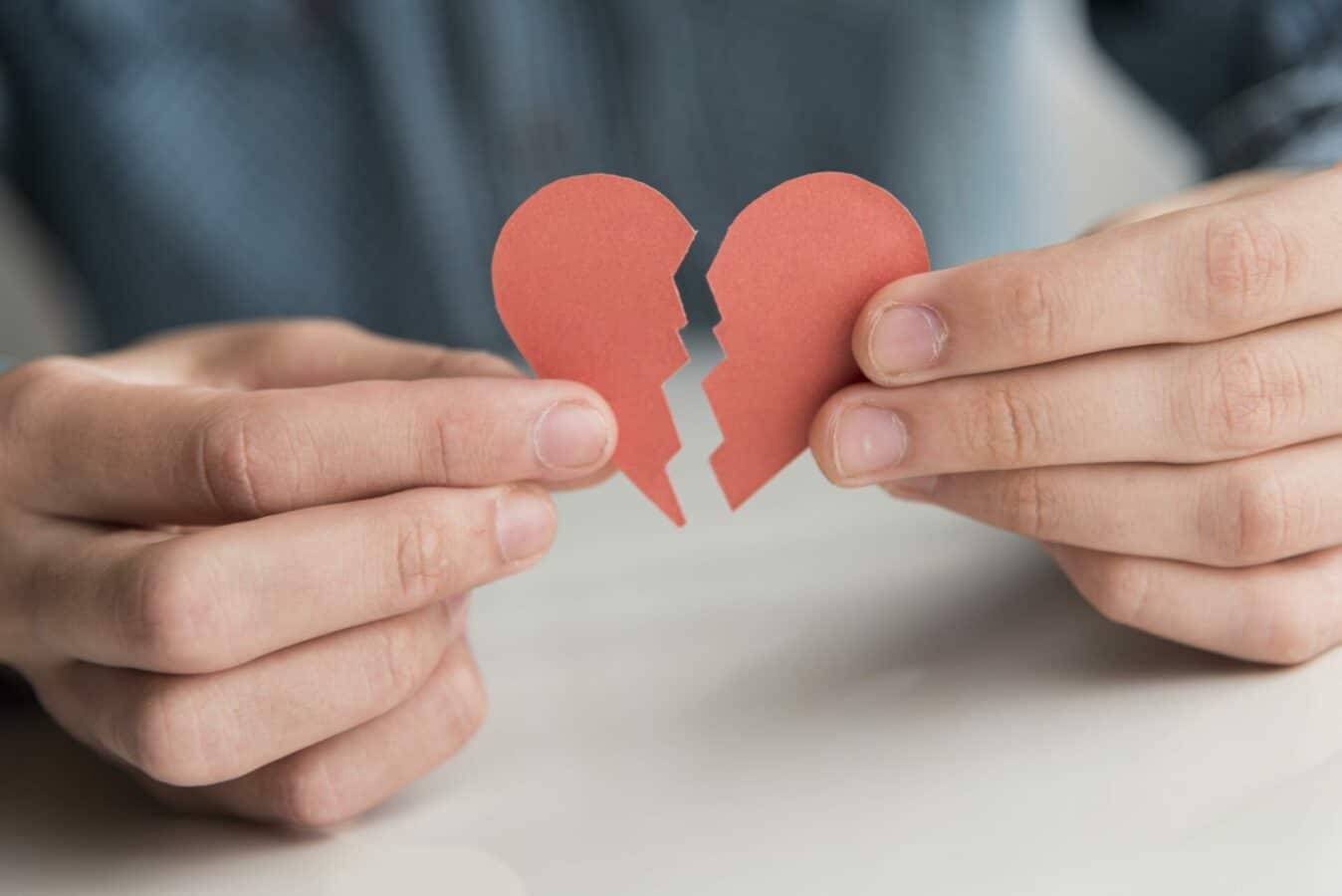Unrequited Love: Signs, Causes, and Tips to Overcome It
Last Updated on June 24, 2024 by TYHO Team

Have you ever found yourself head-over-heels for someone who just does not seem to feel the same way? That’s what we call unrequited love, and it can be a pretty tough pill to swallow. The longing can leave you feeling anxious, depressed, and unworthy. But what exactly is it, and why do some of us always seem to fall victim to it?
According to Leanna Stockard, LMFT, unrequited love occurs when one person has stronger feelings for or receives no reciprocation at all from the other person. In other words, your ooey-gooey feelings for someone are not being returned. This imbalance of affection can cause tremendous emotional turmoil, which can feel like the end of the world. You may even start pondering if there is a way to get over unrequited love.
But here’s the thing: unrequited love is actually more common than you might think. Clinical psychologist Monica Vermani, PsyD, says that most of us have experienced feelings for someone who did not feel the same way about us at some point in our lives. It is a painful experience, but it does not mean your feelings are any less valid.
In this article, we will into the meaning of unrequited love, signs that you are experiencing it, and most importantly, ways to manage it.
It can be frustrating to always have unrequited love situations happening to you. After all, it is not easy to accept that the person you love or desire does not feel the same way about you. So, how do you know if you are facing unrequited love?
One of the most common signs is a lack of effort from the other person to make time for you. For example, if you are constantly initiating contact or making plans while the other person is not reciprocating might indicate that they are not interested in pursuing a romantic relationship. Similarly, if the person you have feelings for is involved with someone else and seems happy in that relationship, it may also suggest that they may not return your feelings.
Another sign of unrequited love is when the other person does not understand you or has no interest in establishing a relationship. This can be particularly difficult if you have feelings for someone who does not even know you exist or is not keen on getting to know you better.
If you are constantly thinking to yourself, “why do I always have unrequited love?” it can be helpful to introspect a little more. Consider why you want to pursue a romantic relationship with them.
You may also experience the following:
Feeling anxious: You may be anxious about the situation and constantly worry about the other person’s thoughts or feelings.
Believing in secret love: You may start to convince yourself that the other person secretly loves you, despite evidence to the contrary.
Intense longing: You may experience intense longing or lovesickness even if you have yet to form a relationship with the person. These feelings can be all-consuming and overwhelming.
Initiating contact: You may find yourself constantly initiating contact with the other person, only to have your attempts go unnoticed or dismissed.
Unmet emotional needs: You may feel like your emotional needs are not being met by the other person, leaving you feeling unfulfilled and unhappy.
Jealousy or possessiveness: You may feel jealous or possessive of the other person, even if you do not have a romantic bond with them. These feelings can lead to resentment and frustration.
It is important to note that experiencing some of these signs does not necessarily mean you have unrequited love. However, if you notice multiple signs and they are causing you distress, it might be a good idea to pause and evaluate the issue at hand.
If you strongly believe that it is unrequited love, one way to deal with it is to focus on moving forward. This may involve accepting that the other person does not share your feelings and instead finding someone who does. It may also include setting boundaries and limiting contact with the other person, if necessary. Ultimately, recognising the signs of unrequited love can help you take control of the situation and move forward in a healthy and positive way.
Unrequited love can take a toll on our emotions. According to experts, it is often fuelled by a craving to fill a void in our own lives. We set our sights on an “ideal” partner who we believe will complete us and make everything perfect. However, this often creates the ideal conditions for unrequited love.
Sometimes, we might idealise the person we love in our minds, focusing only on their good qualities and ignoring their flaws. Other times, we might simply want someone we know we can’t have. The fact that the connection can never be genuine is part of the appeal. For some people, being in love with someone who does not return those feelings allows them to stay in a distant relationship without making other real connections.
Furthermore, unrequited love can provide a sense of safety for someone with an insecure attachment style, as it does not require them to become vulnerable, accept risk, and commit to another person.
You may wonder why unrequited love happens, look up unrequited love quotes online, or fixate on the idea that someone can actually fill your needs.
Unfortunately, if we continue to hold onto the hope that the other person will one day reciprocate our feelings, we may remain stuck in this pattern for a long time. Unrequited love can last as long as we allow it to.
It is important to remember that unrequited love does not reflect our individual worth. It is simply a part of the human experience that we can learn and grow from.
Unrequited love (UL) is unreciprocated and may cause the person to yearn for a more complete love from their crush.
Research shows that all types of UL bonds are 4 times more frequent than equal love (ie people mutually in love with each other). The same study also proved that UL is more intense in turmoil in comparison to equal love.
According to the social psychologist Roy Baumeister, nearly 98% of people have had unrequited love at least once in their lives.
The American Psychological Association released data that showed that around 75% of people who seek talk therapy experience some benefits, including improvement in interpersonal relationships.
Hence, if you are stuck in this situation, know that you are not alone and support is available.

With unrequited love, you might wonder if what you feel is true love or an idealisation of someone.
Love is built on a deep understanding of the other person’s beliefs, feelings, behaviours, and interests. When you lack such knowledge, your desire for the person could be an infatuation that possibly stems from the beliefs you hold about them.
While unrequited love and obsession may sometimes overlap, it is important to note that they are not the same. Obsession is when intrusive, unwanted thoughts that can cause significant distress take over the mind. It is a symptom of obsessive-compulsive disorder (OCD). For instance, limerence in OCD refers to a situation where you think about your love interest so much that it interferes with your daily life.
In some cases, people with unrequited love may convince themselves that the person they desire feels the same way, even when no evidence supports that belief. This is similar to being delusional. Some people with delusions of love, also known as erotomania, believe that a famous person or celebrity is in love with them.
While unrequited love may not be toxic in itself, it can become a problem if it starts to consume your thoughts and interfere with your daily functioning. Therefore, it is essential to take care of your emotional wellbeing. It might help to seek professional help if you are struggling to cope with your feelings. Remember, your worth does not depend on someone else’s feelings towards you.

One of the biggest differences between unrequited love and a breakup is that a breakup usually involves closure. You know that the relationship has ended, and you can begin the process of moving on. You may also have experienced some positive moments with the person you love and found out what didn’t work out.
With unrequited love, however, there is no closure. Instead, the feeling of not knowing what could be can make it difficult to move on. You may never have the opportunity to be with the person you love at all. This can intensify the feelings of loss and disappointment.
Unrequited love is difficult to deal with as it involves an unfulfilled desire that could leave you feeling stuck. When you love someone who does not love you back, you may feel like you have lost the possibility of a future together, along with all the hopes and dreams you had associated with that future.
Another reason is that it can feel like a rejection of who you are as a person and lead you to feel insecure. When someone does not love you back, it can prompt you to start questioning your self-worth. This can lead to feelings of sadness, loneliness, and even depression.
However, it is important to remember that unrequited love does not define you as a person. Just because someone does not love you back does not mean that you are not lovable or desirable. It is simply a matter of compatibility and circumstance.
Unrequited love can have a profound effect on both the body and brain in various ways. For example, when you love someone who does not love you back, it can trigger a stress response in your body, leading to physical symptoms like headaches, muscle tension, and fatigue. Research has shown that the pain of rejection activates the same areas in the brain as physical pain.
Unrequited love can bring about a myriad of physical symptoms such as insomnia, loss of appetite, and even heart palpitations. In addition, the stress and anxiety of the situation can take a toll on your overall health, leading to weakened immunity and susceptibility to illness.
When you experience unrequited love, your brain releases chemicals associated with pleasure and reward, much like it does when you actually receive love and affection. However, in the case of unrequited love, these chemicals are not balanced by the release of oxytocin, the “bonding hormone.” This can lead to an unhealthy cycle of desire and disappointment, contributing to feelings of depression and anxiety.
It can be hard to move on from your feelings, but there are steps you can take to cope with the pain until it lessens.
First, it is important to talk about your feelings. This can be scary, but it is often the best way to address the situation. If you are receiving mixed signals from the person you are interested in, talking through things with them can help clarify things. If that sounds too overwhelming, you can also speak with your friends about what you are going through first. Getting these sentiments off your chest can offer some comfort.

However, once you have discussed it, it is important not to linger on the subject. If the other person has made it clear that they are not interested in a romantic relationship, try to move on.
Continuing to pursue them or hoping they will change their mind can ultimately frustrate them, damage your friendship, and cause you more pain. It is normal to need space and time to cope – get to know each other as friends first rather than force things right away.
It is also important to feel your feelings. Unrequited love involves a lot of emotions, not all of them negative. For example, you might feel eager to see your crush, on top of the world when you get to spend quality time, and deeply unhappy when you realise you will never have more than their friendship. Accept these feelings as they come up without attaching judgment to them. Just notice them and let them pass. Journaling about them can also help you process them.
Does the thought “why does unrequited love happen to me?” bother you? While feeling your feelings and reflecting on these thoughts is important, finding ways to preoccupy yourself is also necessary.
Why not use this opportunity to make extra time for your passion, friends, and other entertaining activities? Take care of yourself by eating healthy meals and staying active. Treat yourself to something small, like buying fresh flowers or having a nice dinner.
Finally, instead of only seeing rejection and pain in unrequited love, try to find meaning in the experience. Although it may be difficult to accept initially, take some time to reflect on your true desires and pay attention to your feelings. Very often, our emotions can guide us towards what we truly want. If you find yourself searching for the meaning of unrequited love, it may be worthwhile to consider if this pattern reveals something about your needs. Perhaps a relationship is not what you truly desire, and that is okay too.
If you are struggling with unrequited love, there are things you can do to help yourself move on. Like discussed in the previous section, one of the most important things is to talk about your feelings with someone you trust. This can help you process your emotions and gain some perspective on the situation.
Remember that time is a great healer and that this feeling of uncertainty will eventually fade away. It may take some time, but with patience and self-care, it is possible to move on and find happiness in other areas of your life.
Ultimately, being kind to yourself and giving yourself the space and time you need to heal will be helpful. Don’t be too hard on yourself! Remember that you are worthy of love and happiness, regardless of whether or not the person you love feels the same way about you.
